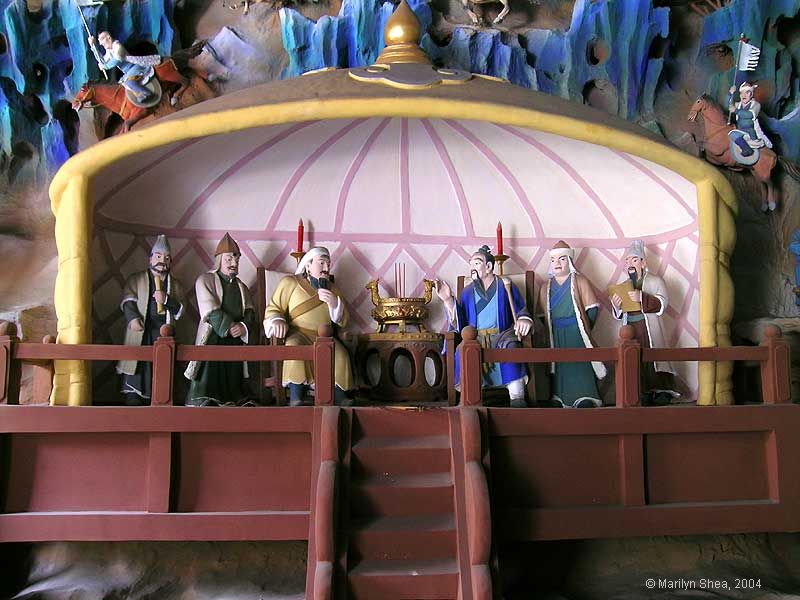On the 22d of the eighth month (September 28) Chenhai came to meet the master, and accompanied him to the emperor's encampment. On his arrival Chen-hai asked the master whether lie wished to be introduced immediately to the emperor, or to rest first. The master begged to be presented. It must be said here that the professors of the Tao (true doctrine), when admitted to an audience, were never required to fall upon their knees or to bow their heads to the ground. On entering the imperial tent, they only made a bow and placed the hands together (a sign of esteem among Chinese monks).
The master was then presented to the emperor, who ordered tung to [=kumis] to be set before him; but the master firmly refused to drink it. The emperor asked him how lie was supplied with victuals in the city where he lived (Samarkand); when [sic: then?] the master expressed his satisfaction. Next day the emperor sent a man to invite the sage to dine every day with his majesty. The master replied: "I am a wild man of the mountains,; I cultivate the true doctrine (Tao), and therefore I like seclusion." The emperor then permitted him to live as he liked.
On the 27th of the eighth month (October 3) the emperor set out on his return to the north (and the master accompanied him). The emperor on the road often sent wine made from grapes, water-melons, and other eatables to the master.
On the 1st of the ninth month (October 6), 1222, we crossed the river (Amu) on a floating bridge, and proceeded to the north.
On the 15th (October 20), at the suggestion of the master, Chinghiz ordered a tent to be prepared for the explanation of the Taoist doctrine. Chen-hai and Chung lu were present at the explanation. The T'ai shi (councillor) A-hai translated the words of the master into Mongol for the emperor. The emperor was highly edified, and the discourse of the sage pleased his heart. On the 19th (October 24) the night was bright, and the emperor called the master again to continue his explanations, with which he was much satisfied. On the 23d the master was again invited. The emperor ordered his words to be written down in Chinese as well as in Mongol.
After this we followed the emperor in his march to the east (i.e., back to Mongolia), and approaching the great city of Sie-mi-sz'-kan (Samarkand), encamped twenty li west of it. On the first of the l0th month (November 5) the master solicited permission to visit the place where he lived before (the palace on the hill near Samarkand), which the emperor granted. The imperial camp then was thirty li east of Samarkand. On the 6th the master appeared again before the emperor, together with the councilor A-hai (who was the interpreter). Chinghiz asked the master: "Shall the bystanders withdraw?" to which he replied that they might remain, and explained to the emperor as follows:
"The wild man of the mountains these many years has devoted himself to the investigation of Tao, and likes to be in solitude. Around the tent of your majesty I hear the noise of your soldiers, and I cannot keep my mind quiet ; therefore I solicit from your majesty the permission to travel henceforth alone, in advance or behind. This will be a great favour to the wild man of the mountains." The emperor assented.
At that time (November) rain first began to fall, and the grass became green again. In that country, in the middle of the eleventh month (December), rain and snow became more frequent and moistened the ground. The master went to Samarkand and distributed the remainder of his provisions to the hungry people, who were very numerous.
On the 26th of the eleventh month (December 29), 1222, we set out on our journey. On the 23d of the 12th month (January 25, 1223) there was a snowfall, and such all intense cold that a great number of our bullocks and horses died on the road. Proceeding to the east, we crossed three days later (January 28) the Ho-ch'an mulien (Syr-daria), and reached the encampment of the emperor (who was also on his homeward journey). We were told there that during the past night the bridge across the river had been broken down and carried away.
Continued ===>>>
pp. 93-96, E. Bretschneider's Mediæval Researches from Eastern Asiatic Sources. (New York: Barnes & Noble, 1888).
